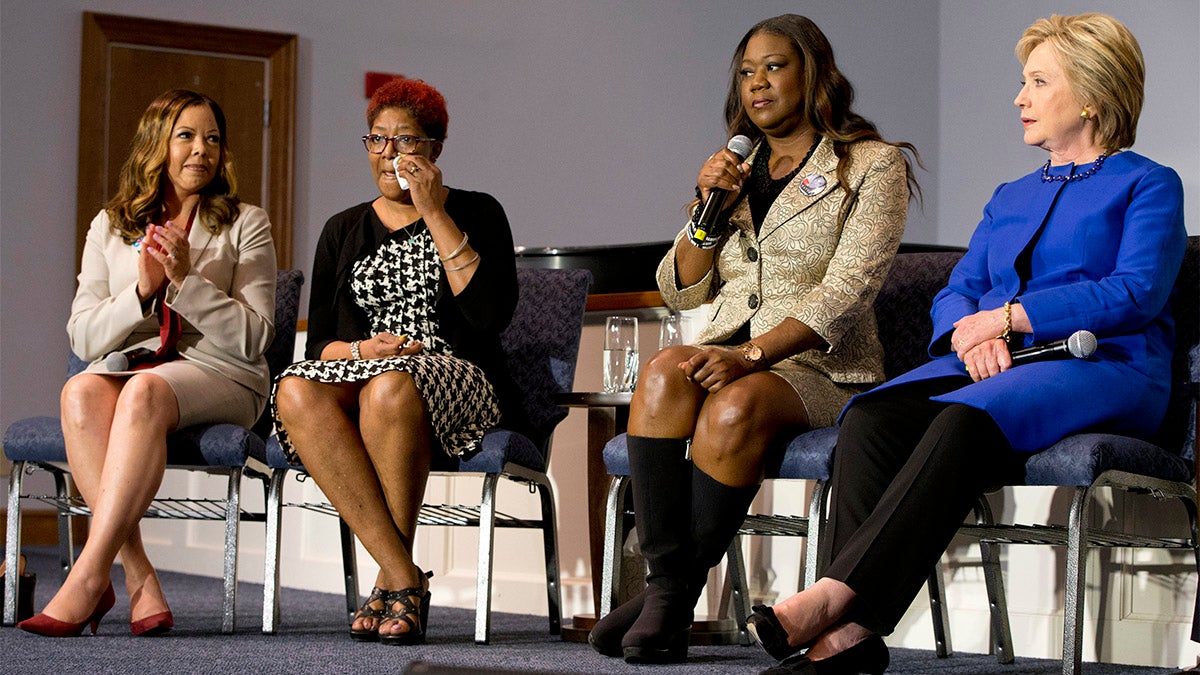Issues of race take center stage for Clinton and Trump

Lucia McBath
This week, race has moved out of the shadows and into the forefront of the presidential campaign.
Endorsements from former Ku Klux Klan leader David Duke and other white supremacists have put Republican frontrunner Donald Trump on the defensive. Trump has vacillated between disavowing Duke and claiming he doesn’t know enough about Duke to take a solid position. Senators Marco Rubio and Ted Cruz have taken the opportunity to condemn Trump for being soft on racism.
But while race has become something of an unwelcome challenge on the Republican side, race has always been more prominent for the Democrats. That’s because support from voters of color is key for any Democrat who hopes to win the White House. Hillary Clinton and Bernie Sanders both knew that going into South Carolina—where African Americans dominate the Democratic Party. And while Clinton came away with a resounding victory thanks largely to her black support, it wasn’t because Sanders didn’t try.
Sanders trotted out a rapper named Killer Mike to shore up his support among younger blacks. To appeal to older African Americans, he leaned on Cornell West, a prominent black intellectual who has spent much of the Obama presidency being sharply critical—some might say disrespectful—of President Obama.
Clinton, on the other hand, took a different tack. In addition to counting on her solid ties to the black political establishment, Clinton leaned on something that Sanders could never hope to replicate. She took advantage of her status as a mother.
That designation gave Clinton a window into the lives of black women who have lost children at the hands of white police officers and others. It allowed her to view race through a lens no man could hope to see.
The mothers included Sybrina Fulton, the mother of Trayvon Martin; Maria Hamilton, the mother of Dontre Hamilton; Lucia McBath, the mother of Jordan Davis; Geneva Reed-Veal, the mother of Sandra Bland; and Gwen Carr, the mother of Eric Garner.
Each mother had a story to tell. They are stories we’ve heard before.
Trayvon Martin was shot dead by George Zimmerman, a neighborhood watch volunteer. Dontre Hamilton was shot 14 times by a Milwaukee police officer. Eric Garner was choked to death by a police officer on Staten Island. Jordan Davis was shot dead by a white man who believed Davis’s music was too loud at a gas station. Sandra Bland died in a jail cell three days after being pulled over and arrested by a trooper in Texas.
But remembering those heart wrenching stories of motherhood and grief, of violence and race, were more than just campaign messages. They served as a powerful reminder of what it means to be a mother.
Hillary Clinton, after numerous communications and meetings with those mothers, gained their trust. And I believe that trust came from something beyond politics. I believe it came from the fact that only another mother can truly empathize with a woman who’s lost a child.
Perhaps joining Hillary on the campaign trail in South Carolina gave those mothers the sense that they’re doing something, that they’re honoring the memories of their lost children, that they are moving toward making sure no other mother ever has to feel their pain.
There are Sanders supporters, including Eric Garner’s daughter, Erica, who feel differently. That is their right. But if Sybrina Fulton, Gwen Carr, Maria Hamilton, Lucia McBath, and Geneva Reed-Veal believe Hillary Clinton can empathize with them, then we should allow them to feel that way.
I don’t pretend to know which candidate can best address the issues that have beset the black community. But I know what it’s like to look into the eyes of a parent who’s lost a child. And I know that no matter who eventually wins the presidency, the interconnected issues of race and excessive force must be addressed.
Perhaps by campaigning with Hillary Clinton, these mothers will force candidates from both parties to take another hard look at their stories.
Because no matter what one feels about the role of race in the presidential campaign, this much is certain. No mother should ever have to lose a child to violence. No mother should have to feel a pain that deep.
Listen to Solomon Jones weekdays from 7 am to 10 am on 900 am WURD
WHYY is your source for fact-based, in-depth journalism and information. As a nonprofit organization, we rely on financial support from readers like you. Please give today.


